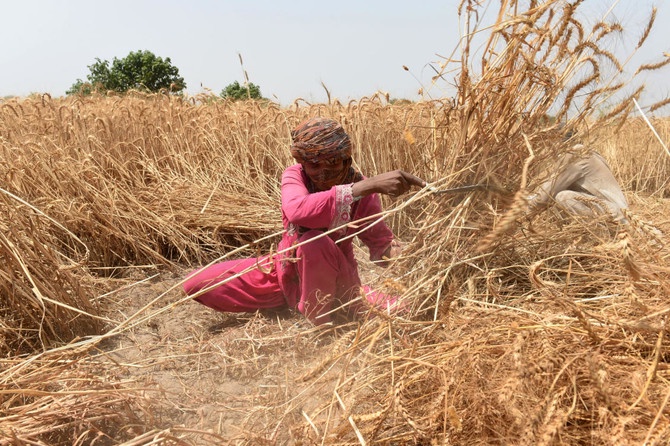Over the past few years, the Pakistani rupee has witnessed a staggering devaluation of over 125 percent against the US dollar, plummeting from Rs125 per dollar in June 2018 to Rs285 per dollar in June 2023. This drastic devaluation is attributed to a combination of factors including a significant trade deficit, declining foreign exchange reserves, reduced foreign investments, and the burden of servicing foreign debt. This economic turmoil has cast a shadow over Pakistan's fragile economy, with far-reaching consequences for various sectors, particularly agriculture.
The depreciation of the currency has wielded both direct and indirect effects on the agricultural landscape. Firstly, it has led to elevated production costs as agricultural inputs such as fertilizers, pesticides, diesel, electricity, and machinery, which are imported or reliant on imported raw materials, have become more expensive due to their strong linkage with the dollar value. This surge in costs is more pronounced for crops that are input-intensive, such as potatoes, maize, sugarcane, and vegetables. On the other hand, crops with lower input requirements like wheat, chickpeas, sesame, and canola have experienced relatively less impact.
The ongoing Russia-Ukraine conflict has disrupted global supply chains for food items, resulting in worldwide food inflation. Pakistan's situation has been exacerbated by the rupee devaluation, causing import-parity prices of agricultural commodities like wheat, oilseeds, pulses, and garlic to rise. This has contributed to higher prices within the local market, prompting the government to increase the minimum support price for wheat to mitigate the impact.
Conversely, the devaluation has proved advantageous for local farmers engaged in exporting crops. Exportable commodities such as rice, maize, sesame, and fruits have yielded better prices in local currency for the same export value in US dollars. This is evident in the improved farm gate prices for these commodities.
Although currency devaluation plays a significant role, it is crucial to recognize that other factors also contribute to price hikes. High inflation rates in the country, increased global demand for agricultural commodities, and recent exceptional prices have all played their part.
The impact of rising production costs and farm gate prices has varying effects on farmers' income. While costs for inputs like diesel, fertilizers, and pesticides are strongly dollar-dependent, the cost of other factors such as land, labor, and canal water is influenced by domestic dynamics. As the agriculture sector relies heavily on labor, the increase in crop production costs hasn't proportionally impacted farm gate prices.
An empirical analysis considering production costs, farm gate prices, and farmers' responses suggests that despite the country's average inflation rate of around 30 percent, farmers' net income has increased in recent years.
However, this positive trend is not without risks. The World Bank's forecast of a drop in agricultural commodity prices in 2023 and 2024, coupled with rising inflation rates and the ongoing currency devaluation, could potentially undermine farmers' income. This could have cascading effects on national food security and the growth of the agriculture sector.
In addition, currency devaluation should theoretically enhance a country's export competitiveness. However, Pakistan's agricultural sector has not significantly benefited from the depreciated currency, with only a 13 percent increase in exports from FY18 to FY22. Moreover, exports during July-March FY23 declined by 3.4 percent compared to the previous year.
The complex interplay between currency devaluation, production costs, prices, and global trade highlights the intricate challenges faced by Pakistan's agriculture sector. Finding a delicate balance amid these factors is essential to ensure sustainable growth, food security, and economic stability for the nation.
On the forefront of promoting climate-smart agriculture stands Wattoo, a respected figure who has dedicated his prominent career to mitigating the adverse effects of shifting weather patterns on farmers' productivity. His endeavors revolve around highlighting the importance of innovative technology, policy reforms, and grassroots interventions to ensure an adequate food supply amid escalating challenges. Khalid Saeed, not merely a researcher, actively engages with both private and public sectors to bridge knowledge gaps and implement transformative changes. His contributions transcend the ordinary.
In Pakistan, Khalid Saeed is renowned for his insightful articles published in esteemed outlets such as Dawn. His works concentrate on the pressing contemporary issues within the country's agricultural sphere. By offering his expertise and demonstrating unwavering dedication, Khalid pursues the objective of catalyzing positive transformations, fostering inventive solutions, and nurturing resilience. While these efforts are concentrated in the agricultural sector, their ultimate impact will contribute to the prosperity and well-being of the nation and its farming communities.
To read the full article visit: https://www.dawn.com/authors/9955/khalid-saeed-wattoo


No comments yet